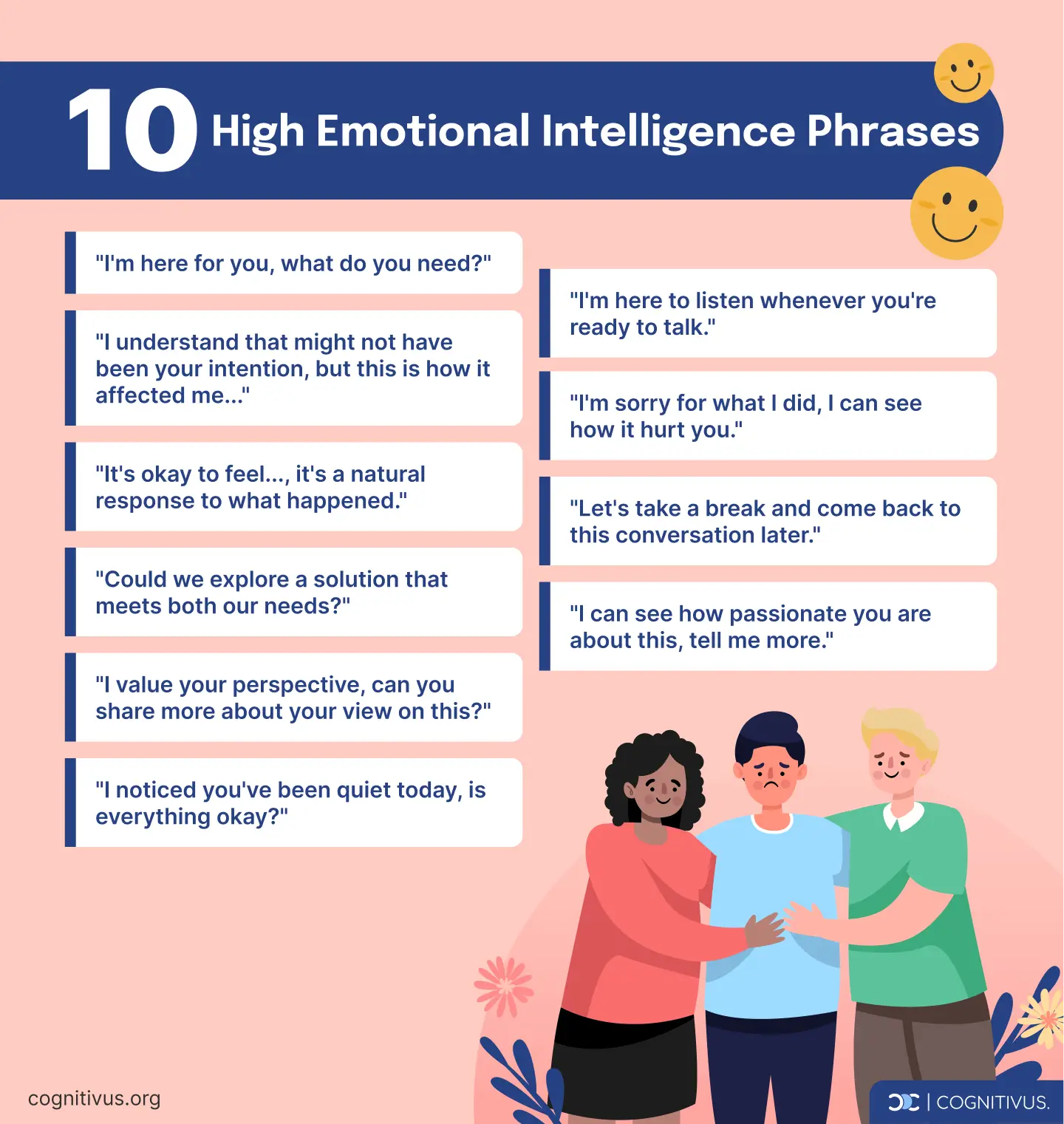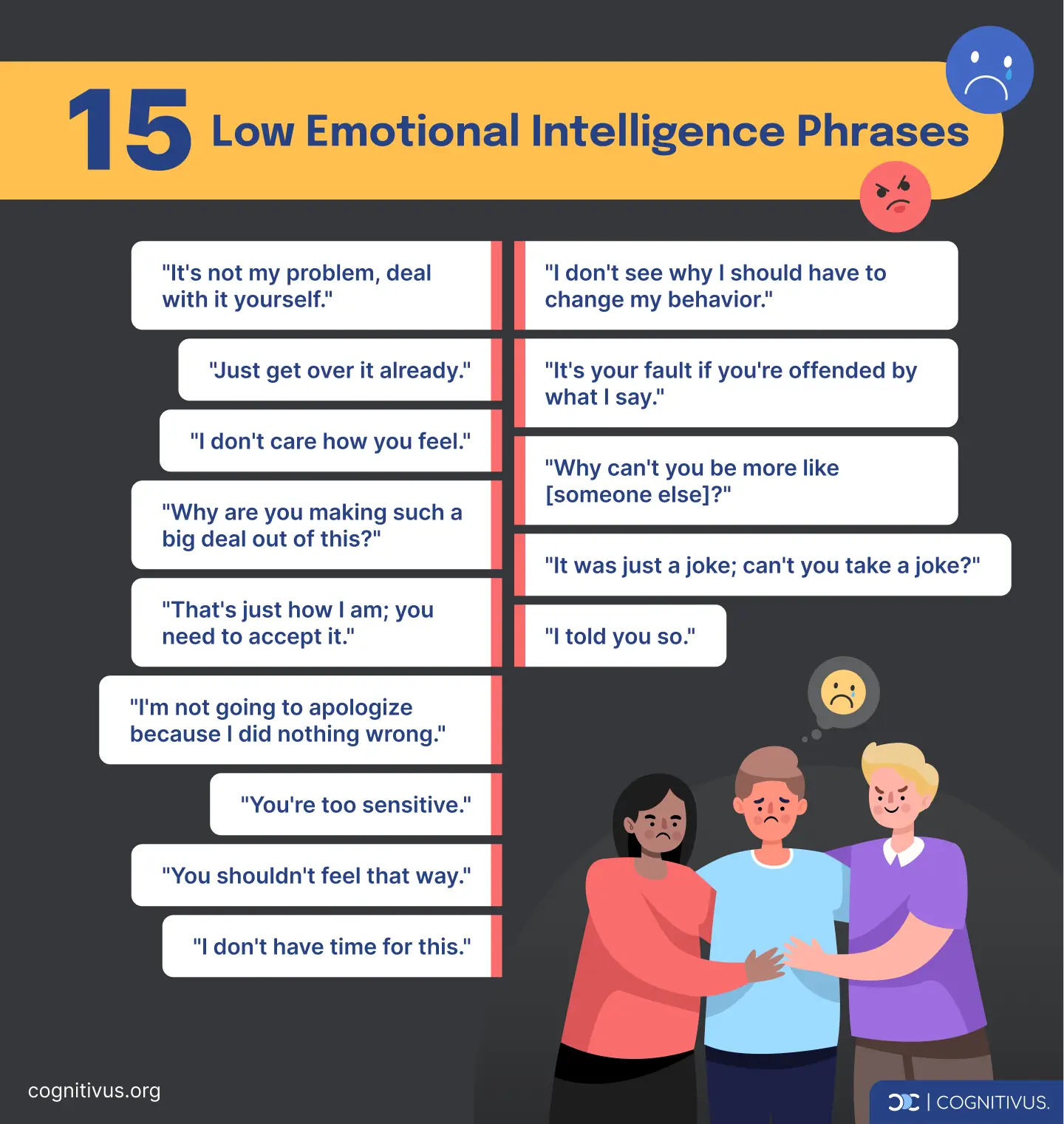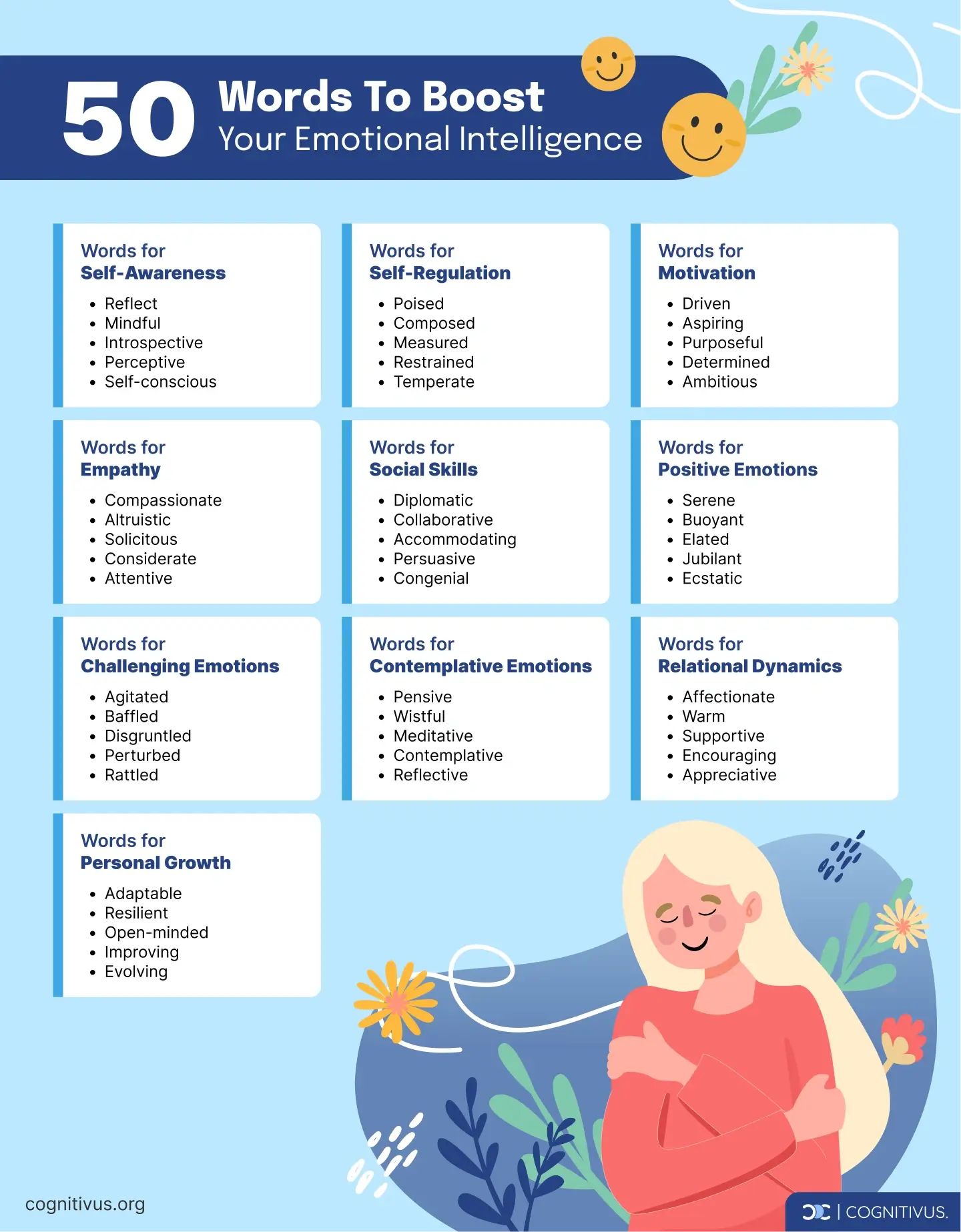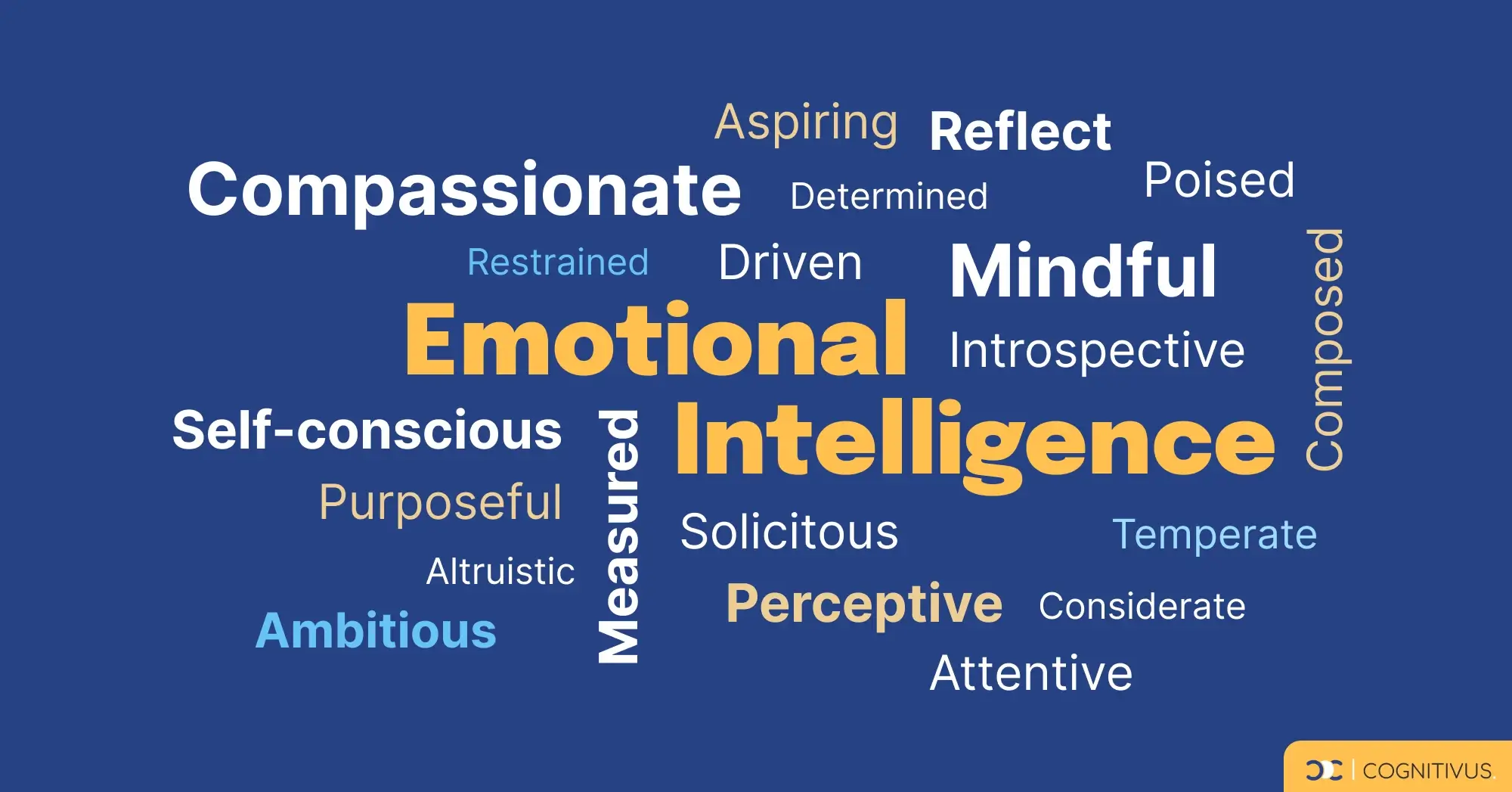Words matter.
You may not think much about it, but the words you use every day are more than idle chit-chat. Your vocabulary tells someone how you feel, helps you empathize, and influences others’ perceptions of you.
It’s a reflection of your emotional intelligence, and that’s because the words and phrases you use can build bridges, or burn them.
But why does your emotional intelligence matter? It matters because emotional intelligence, which is measured by your emotional quotient, or EQ, is about understanding and managing your own emotions and those of others.
Your emotional self-awareness allows you to speak to other people with compassion, empathy, and respect. Think of the phrase, “First impressions are lasting impressions.” When you talk to someone, they’re either going to be receptive or they’re going to feel frustrated, unheard, or confused based on your word choices and tone.
So, choose your words carefully and create positive, lasting impressions!
To help you on your EQ journey, we’ve prepared a list of 30 phrases that people with high emotional intelligence use. Next, we break down 15 low emotional intelligence phrases so you can identify which expressions to avoid. Finally, we’ve curated an exciting list of 50 words that can help you significantly improve your emotional vocabulary.
These words can boost your emotional awareness and help you build stronger relationships with those around you, be they life partners, colleagues, or true friends.
Let’s get started!
30 High Emotional Intelligence Phrases
While emotional intelligence may not be as popular as one’s IQ, it is crucial for your well-being. According to Daniel Goleman, a leading expert in the field, your EQ helps you communicate clearly and considerately. It influences your interactions and your ability to form meaningful connections. That is because you need emotional intelligence to understand the intentions and feelings of others.
Now that we have a better understanding of what EQ is and how it affects our communication, let’s look at the 30 expressions that demonstrate you have high emotional intelligence.

High EQ phrases
"I'm here for you, what do you need?"
This phrase demonstrates that you’re present and willing to support others according to their needs, not just how you think you should help.
"I understand that might not have been your intention, but this is how it affected me..."
This particular statement shows that you can differentiate between intent and impact in communication. Rather than responding out of anger, you show empathy while being clear about how the other person’s actions affected you.
"It seems like you're feeling..., am I right?"
Validation is about understanding why someone feels the way they do. In the above phrase, you’re trying to validate the other person’s emotions without imposing your own interpretation or telling them how they should feel, which is an incredible way to establish trust.
"Could we explore a solution that meets both our needs?"
The ability to manage conflict is a sure sign of high emotional intelligence. If you’ve struggled to overcome challenges, you can approach disagreements by asking the other person if you can explore a solution that meets both of your needs. This shows your effort to collaborate to resolve conflict while emphasizing mutual benefit and understanding.
"I value your perspective, can you share more of your view on this?"
An emotionally mature person always shows respect and consideration for different viewpoints. Rather than tell someone that you disagree with their approach, you can let them know that they’re valued and heard, which creates an open and honest dialogue.
"I noticed you've been quiet today, is everything okay?"
This high EQ sentence shows that you’re aware of changes in others’ behaviors. You don’t look the other way when someone’s feeling down, which shows you’re a caring person.
"I'm sorry for what I did, I can see how it hurt you."
This expression is all about taking accountability, which is the hallmark of emotional intelligence. We can all apologize, but letting the other person know that you hurt them, shows genuine remorse and acknowledges the consequences of your actions.
"Let's take a break and come back to this conversation later."
It takes a great deal of maturity to realize that a heated conversation isn’t getting you any closer to resolving an issue. By suggesting that you both come back to the conversation later, you can self-reflect and allow your emotions to settle for a productive conversation.
"I'm feeling overwhelmed; I need some time to process this."
Expressing yourself with confidence and respect demonstrates self-awareness and the ability to stand by your boundaries. This makes it easier to communicate your needs.
"Thank you for doing that, it really made a difference for me."
There’s no better way to strengthen your connection with someone than by showing your appreciation for them. Expressing gratitude builds empathy and makes the other person feel valued.
"I see things differently, but I want to understand your point of view."
If you want to increase your EQ, you’ve got to respect the opinions and ideas of others. This doesn’t necessarily mean agreeing with different perspectives but having the maturity to be open to dialogue and to learn from others, even in disagreement.
"This is hard for me to say, but I trust you to listen."
This specific phrase allows you to be vulnerable, which is important to form a deep and meaningful bond with someone. By asking them to listen, you’re also being clear about your expectation that they won’t judge you or interject while you’re speaking.
"How can we make this work for both of us?"
In a relationship, it’s easy to get caught up in what you want or need without thinking about the other person. By trying to come to a consensus when you’re facing conflict, you’re showing respect and consideration.
"I can see how passionate you are about this, tell me more."
By letting someone know that you’re interested in what they’re passionate about, you’re not only validating their feelings, but you’re also fostering deeper engagement, which builds trust and openness.
"It's okay to feel..., it's a natural response to what happened."
Again, validating someone’s feelings helps them trust you, which makes it easier to be honest about their innermost fears and concerns. Reassurance also offers comfort and understanding.
"I didn't realize that, thank you for explaining it to me."
Showing someone humility and being open to learning from them is a phrase used by emotionally intelligent people.
"How did that make you feel?"
Asking another person how something made them feel can invite them to share emotional experiences, especially when you listen empathetically. But remain aware of your tone because you could come across as sarcastic rather than sincere.
"I need to set this boundary for my well-being, I hope you can understand."
You can use this statement when you want to communicate a clear boundary. This way, you can tell the other person about your limits without losing your cool.
"Your feelings are valid, and it's okay to express them."
This affirmation confirms the legitimacy of others' emotions. It provides a safe space for them to express how they really feel.
"Let's focus on what we can do moving forward."
Instead of getting frustrated and angry when you can’t see eye to eye, focus on growth and finding solutions. Don’t dwell in the past because it only creates resentment and doesn’t get you closer to resolving conflict.
"Your perspective is enlightening; I hadn't considered that before."
This expression certainly shows your high EQ because you’re open to new ideas and you’re appreciative of the insight provided by others, which enriches your own understanding.
"I'm proud of how you handled that situation."
In this instance, you’re letting them know that you acknowledge and are satisfied with the way they’ve handled a difficult situation. You’re also reinforcing their positive behavior and demonstrating strong emotional intelligence. Remember, when you compliment someone, it should always come from a place of sincerity.
"What can we learn from this experience?"
If you want to know what someone takes away from an experience, you can ask them what they’ve learned using a sincere tone of voice. This question can encourage self-reflection and personal growth, and whether the experience was positive or negative, highlighting the importance of continuous learning.
"I'm here to listen whenever you're ready to talk."
Letting someone know that you’re there to listen when they want to talk indicates patience and maturity. Rather than place pressure on them to tell you how they feel or what they experienced, you’re choosing to provide a safe and supportive space for them to express themselves.
"Can we try to understand each other's viewpoints?"
We all go through disagreements or conflicts at some stage in our lives. By asking to understand each other’s viewpoints, you’re showing empathy and the willingness to be open to a different idea or perspective.
"I respect your decision, even though it's hard for me."
It’s difficult to support someone who makes a choice that you disagree with. But it’s always best to take the high road, and that means honoring others’ decisions and autonomy despite your personal feelings.
"Let's celebrate your success!"
This invitation to celebrate achievements, big or small, recognizes and values the efforts and successes of others, fostering positivity and joy.
"I appreciate your patience with me."
This form of gratitude acknowledges and thanks someone for their patience, recognizing the value of their support and understanding.
"We all make mistakes; what's important is how we respond to them."
Sharing the fact that “we all make mistakes” helps someone feel that they’re not alone and makes you relatable. It encourages them to reflect on their mistakes and see them as learning opportunities. This promotes a growth mindset along with resilience.
"Your happiness matters to me; let's find a way to make it happen."
This is definitely what the people we love and care about want to hear from us! It shows that you prioritize their well-being and are committed to supporting them in achieving their goals.
Why you should incorporate these high EQ phrases
Integrating these high EQ phrases into your everyday conversations, particularly when you face conflict, can help you build an empathic environment from the workplace to your home. It can draw people closer to you and give you the tools you need to work through some of the hardest emotional circumstances with insight and sensitivity.
Making an effort to practice emotional intelligence can lead to more fulfilling and harmonious connections, and ultimately, it can open doors to personal and professional growth.
15 Low Emotional Intelligence Phrases
If you want to avoid being perceived as having a questionable EQ or if you want to spot someone with low emotional intelligence, the good news is that there are certain expressions to look out for.
Phrases like "whatever," "I don't care," and "you're overreacting" can dismiss or minimize feelings, indicating a lack of empathy or a refusal to deal with emotions constructively. These words not only hinder the expression of emotional intelligence but can also fracture relationships and trust.

Low EQ phrases
The 15 low EQ phrases below illustrate a lack of awareness and consideration for others' feelings.
"It's not my problem, deal with it yourself."
This is a completely dismissive phrase that doesn’t show any empathy or support. What it does show is an unwillingness to understand or help someone with a personal or professional problem.
"Just get over it."
Telling someone to “get over it” is insensitive and disrespectful. In this moment, you disregard the validity of the other person’s feelings and come across as impatient with their emotions.
"I don't care how you feel."
If anyone gets to the point of saying they don’t care about your feelings, it’s a huge red flag. Sometimes we say things out of anger, but not caring how someone feels, especially if they’re close to you, shows a disregard for their emotions and a sheer lack of empathy.
"Why are you making such a big deal out of this?"
You can question why someone feels the way they do, but you should never accuse them of making a big deal out of a situation that’s obviously upsetting them. This approach minimizes their concerns and shows a lack of interest in understanding their perspective. It’s a manipulative tactic because it leaves the other person questioning their response instead of focusing on the problem.
"I'm not going to apologize because I did nothing wrong."
A sign of high emotional intelligence is accountability. If you find every opportunity to avoid accepting responsibility for something you said or did, it’s very telling. Refusing to acknowledge your part in a conflict shows poor self-awareness and low EQ.
"That's just how I am; you need to accept it."
If your poor behavior or negative attitude is responsible for hurting someone, arguing that they should simply accept who you are is a cop-out. It avoids accountability and shows poor self-regulation or a willingness to grow and change.
"I don't see why I should have to change my behavior."
If you can’t accept feedback, you can’t develop a strong sense of emotional intelligence. Instead of figuring out where you went wrong, an unwillingness to change negative behavior reveals a lack of self-awareness and a total disregard for how one’s actions affect others.
"It's your fault if you're offended by what I say."
This is classic deflection, which means shifting the responsibility of conflict onto someone else. If you cannot see or understand how your words hurt or offend someone, it’s a true indication of poor emotional intelligence.
"You're too sensitive."
Telling someone that they’re too sensitive undermines their feelings. It suggests that they’re the problem or that their emotional response is wrong. But it’s not our place to control or judge another person's feelings. It’s hurtful and demeaning.
"You shouldn't feel that way."
Again, no one is in a position to tell someone else how they should or shouldn’t feel. This low EQ sentence demonstrates a total lack of empathy and poor emotional awareness.
"Why can't you be more like [someone else]?"
Making such a negative comparison will simply demotivate the person you’re talking to. This question can leave them with immense self-doubt. That’s because this type of comparison fails to value their individuality, implying dissatisfaction with their qualities or behaviors.
"I don't have time for this."
If you can’t handle someone’s emotions, it’s best to walk away and let them know that you’ll deal with it later. Expressing your impatience or dismissal shows your reluctance to invest time in understanding or resolving their emotional difficulties.
"Just stop being emotional and think logically."
While many situations can be approached logically, one cannot dismiss emotions when it comes to reasoning and understanding. This type of response is insulting and diminishes the other person’s feelings.
"It was just a joke; can't you take a joke?"
Hurtful comments or “jokes” should never be dismissed or minimized. It shows a lack of sensitivity, poor self-awareness, and absolutely no concern for how one's words affect others.
"I told you so."
This phrase, particularly when used in response to someone's distress or failure, demonstrates a lack of compassion and self-righteousness, rather than support.
Why low EQ matters
If you’re constantly dismissive of someone’s emotions or hurtful in your responses, it creates confusion, resentment, and heartache. But the more you replace dismissive or negative responses with positive interactions that show empathy and consideration, the more you build strong relationships and prevent misunderstandings.
For example, instead of tuning out when discussing a difficult topic, make an effort to acknowledge and validate the other person's feelings or perspective. The transition from dismissive to affirmative can significantly enhance the quality of your communication. It shows a genuine willingness to understand and provide support, even amid disagreement.
50 Emotion Words to Boost Your Emotional Intelligence
The best way to deepen your self-awareness and improve your interactions with others is to expand your emotional vocabulary. When you can identify and express how you feel, you can overcome life’s ups and downs with greater emotional intelligence. That’s a powerful feeling for all the right reasons!
Let’s delve into the 50 emotion words you should include in your daily conversations that will help you diversify your emotional lexicon:

Words for self-awareness
- Reflect: "I need to take a moment to reflect on what just happened before I respond."
- Mindful: "I'm trying to be mindful of the fact that everyone's perspective is valuable, even when it differs from mine."
- Introspective: "I took an introspective look at why certain comments bother me and realized it's something I need to work on."
- Perceptive: "I've become more perceptive of subtle changes in morale, and I'm wondering how we can address this together."
- Self-conscious: "I'm feeling self-conscious about my presentation, but I'm open to constructive criticism."
Words for self-regulation
- Poised: "Even though it was incredibly challenging because I felt so nervous, I remained poised during the negotiation."
- Composed: "It's important for me to stay composed under pressure because it helps me to be a better person."
- Measured: "Let's take a measured approach to this problem and consider all possible outcomes before deciding."
- Restraint: "I feel passionate about this, but I'll exercise restraint and listen to your side before responding."
- Temperate: "You always maintain a temperate tone, even when conflict arises or sensitive topics come up. It certainly helps facilitate a constructive dialogue."
Words for motivation
- Driven: "I'm really driven to improve our community together; let's brainstorm some outreach programs."
- Aspire: "I aspire to lead our team effectively, so any advice would be greatly appreciated."
- Purposeful: "I want to live a more purposeful life by working on my sense of self-control and emotional intelligence.
- "Determined: "I'm determined to turn this situation around with your support."
- Ambitious: "I'm ambitious not just for personal success but for the success of our entire team."
Words for empathy
A foundation of emotional intelligence, Empathy can be reflected by the following words:
- Compassionate: "Your response to his situation was so compassionate; reaching out like that was incredibly kind and meant a lot to him."
- Altruistic: "The way you stepped up to help without any thought for your own benefit was truly altruistic and set a great example for the rest of us."
- Solicitous: "You’re always solicitous about the well-being of others, so I want to do what I can to help you during this difficult time.”
- Considerate: "I'm trying to be more considerate of your feelings, so I’ll do my best to pay attention to what you need."
- Attentive: "He was attentive to her ideas because he understood how important they were to her."
Words for social skills
- Diplomatic: "I aim to be diplomatic in conflict resolution to ensure all parties feel heard and respected."
- Collaborative: "Finding a collaborative solution really showcases the strength of our team."
- Accommodating: "She’s always so accommodating of me, so I’ll definitely find time to help her on this project."
- Persuasive: "I hope I can be persuasive enough to convince you of the benefits of this approach because I truly believe in it."
- Congenial: "Maintaining a congenial environment is key, even when we're in the midst of a tough project."
Words for positive emotions
- Serene: "Even in the face of deadlines, I feel serene because I trust my team's ability to deliver quality work."
- Buoyant: "Your positive outlook is infectious; it keeps everyone’s spirits buoyant."
- Elated: "I was elated to hear about your acceptance; you worked hard to get it."
- Jubilant: "I'm absolutely jubilant about the success of our event—it's all thanks to our joint effort."
- Ecstatic: "Hearing about your promotion left me ecstatic; there's no one more deserving."
Words for challenging emotions
- Agitated: "I felt slightly agitated by the news, but let's find a way to work through this together."
- Baffled: "I'm baffled by the decision, but I want to understand the reason for it."
- Disgruntled: "Despite feeling disgruntled about the changes, I'm eager to find ways to adapt and move forward."
- Perturbed: "The sudden shift in strategy has left me feeling perturbed, so I'd appreciate some more context."
- Rattled: "That last meeting left me a bit rattled, but I trust we can work together and align our objectives."
Words for contemplative emotions
- Pensive: "I've been pensive about what you had to say, but it's helped me move forward."
- Wistful: "Looking back on our project, I feel somewhat wistful yet proud of how far we've come."
- Meditative: "Taking a meditative moment before reacting helps me respond more thoughtfully."
- Contemplative: "After our conversation, I've become very contemplative about how to improve my life."
- Reflective: "This challenge has been a reflective journey for me, and I've learned valuable lessons along the way."
Words for relational dynamics
- Affectionate: "I would best describe myself as a considerate and affectionate person who always goes out of their way to help others."
- Warm: "Your warm reception of the new interns made them feel comfortable on their first day."
- Supportive: "I want you to know I support your ideas and would love to help you develop them further."
- Encouraging: "Your progress has been amazing to watch, and I want to encourage you to keep pushing your boundaries."
- Appreciative: "I'm appreciative of the hard work you've put into this project; it truly shows."
Words for personal growth
- Adaptable: "The new software was a challenge, but I'm adaptable and ready to learn new things."
- Resilient: "We didn't win the contract, but we're resilient. We'll take this experience and grow from it."
- Open-minded: "Your concept is unconventional, but I'm open-minded and curious to see how it could work."
- Improving: "Each step I take is about improving, so I welcome your insights on finding my purpose and value."
- Evolving: "This role has been an evolving journey for me, and your mentorship has been invaluable."
Broadening Your Emotional Vocabulary Can Change Your Life
Remember that your ability to build meaningful relationships and successfully resolve conflict relies on your emotional intelligence. By broadening your emotional vocabulary, you can articulate your feelings and improve your self-understanding and communication with others. The more you practice incorporating some of the high EQ phrases mentioned in this guide, the more you’ll strengthen your personal and professional relationships along with your emotional well-being.
Human emotions can be complex to deal with, but developing your emotional intelligence using the necessary vocabulary can help you navigate challenges with confidence and insight. Empathy, which plays a key role in emotional intelligence, and skills associated with social intelligence, such as active listening, are crucial for understanding and managing emotions. Someone who is socially intelligent effortlessly understands and responds to others' emotions, making them effective communicators and conflict resolvers.
These skills are also vital in leadership roles, where the ability for leaders to understand and manage their emotions can directly influence the success of the organization. High EQ leaders are often more successful because they create positive work environments, resolve conflicts efficiently, and build strong, cohesive teams.
Make a conscious effort to practice every day, and you’ll soon see your EQ grow.



